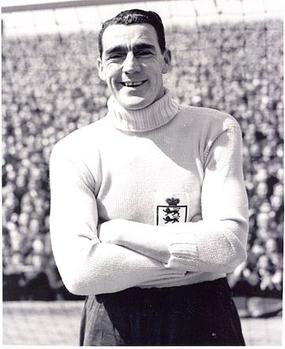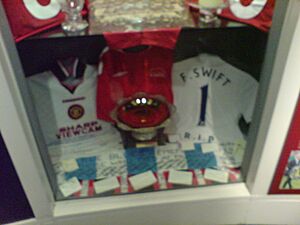Frank Swift facts for kids
 |
|||
| Personal information | |||
|---|---|---|---|
| Full name | Frank Victor Swift | ||
| Date of birth | 26 December 1913 | ||
| Place of birth | Blackpool, Lancashire, England | ||
| Date of death | 6 February 1958 (aged 44) | ||
| Place of death | Munich, West Germany | ||
| Height | 6 ft 2+1⁄2 in (1.89 m) | ||
| Position(s) | Goalkeeper | ||
| Senior career* | |||
| Years | Team | Apps | (Gls) |
| 1933–1949 | Manchester City | 338 | (0) |
| → (wartime league) | 134 | (0) | |
| 1939–1945 | → Aldershot (guest) | 12 | (0) |
| 1939–1940 | → Liverpool (guest) | 2 | (0) |
| 1941–1942 | → Charlton Athletic (guest) | 1 | (0) |
| 1942–1943 | → Fulham (guest) | 5 | (0) |
| 1942–1943 | → Reading (guest) | 4 | (0) |
| Total | 338 | (0) | |
| International career | |||
| 1939–1946 | England (wartime) | 14 | (0) |
| 1946–1949 | England | 19 | (0) |
| *Club domestic league appearances and goals | |||
Frank Victor Swift (born 26 December 1913 – died 6 February 1958) was a famous English football player. He was a goalkeeper for Manchester City and the England national team. Frank started his football journey with local clubs near his hometown of Blackpool. In 1932, he joined First Division team Manchester City. He played for them his whole professional career.
Swift became a regular player for Manchester City in 1933. He helped his team reach the 1934 FA Cup Final, where they won 2–1 against Portsmouth. Three years later, Swift won a League Championship medal. He played in every game during Manchester City's winning season. World War II stopped him from playing many years in his prime. But he still played for England in special wartime matches. After the war, he played 19 official international games for England between 1946 and 1949.
Frank Swift stopped playing football in 1949. He then became a journalist, writing about football for the News of the World newspaper. Sadly, he died at age 44 in the Munich air disaster. This happened after he reported on a Manchester United game in the European Cup.
Contents
Frank Swift's Football Journey
Early Career and Big Wins
Frank Swift was born in Blackpool, a town on the coast of England. His first football team was Blackpool Gas Works, where he also worked. After playing for Fleetwood, many big clubs noticed him. These included Blackpool, Blackburn Rovers, and Manchester City. Manchester City, a top team in the First Division, offered him a contract first.
In October 1932, 18-year-old Swift joined Manchester City as an amateur. The next month, he became a professional player. He earned ten shillings (about 50p) a week. In December, he joined the first team, even though he had only played three reserve games.
At that time, Manchester City's goalkeeper position was not settled. Frank got his chance after another goalkeeper got injured. His first game was on Christmas Day, 1933. He let in four goals. But the next day, on his 20th birthday, he played a great game and kept a clean sheet (meaning no goals were scored against him). After that, Swift played in every first-team game for over four seasons. This was more than 200 games in a row!
Even though he was a regular player, Frank had some tough games. In one early match, he let in seven goals. He thought he wouldn't play again. But he kept his spot.
Manchester City was a strong team in the 1930s. In Swift's first season, they reached the FA Cup final for the second year in a row. During this time, many people came to watch football games. Swift played in front of 84,569 fans at Maine Road, which was a record for an English club ground.
In the FA Cup final, Manchester City played Portsmouth. Swift was the youngest player and felt very nervous. He wasn't sure if he should wear gloves because the field was wet. He saw the other team's goalkeeper wasn't wearing gloves, so he decided not to either. Portsmouth scored first. At halftime, Swift felt bad, blaming himself. But his teammate, Fred Tilson, told him not to worry. Tilson then scored two goals in the second half, winning the cup for City! When the final whistle blew, Swift was so happy he fainted. He soon recovered to get his winner's medal from King George V.
Manchester City started the 1936–37 season slowly. They were in the bottom half of the league until December. But after Christmas, they started a long winning streak. By April, they were second in the league. They then beat Arsenal, who were the top team. This win put City at the top of the table. They kept winning until the end of the season. Manchester City won their first league championship with a 4–1 win. Swift was known for how far he could kick the ball, which helped with one of the goals in that game.
The next season, 1937–38, was disappointing. Manchester City scored many goals in some games, but they also lost often. On the last day of the season, they lost 1–0. Even though they scored more goals than any other team, the reigning champions were sent down to the Second Division.
Playing Through Wartime
During World War II, Frank Swift continued to play for Manchester City. He played 134 wartime league games. He also joined the British Army. He was one of many professional footballers who joined a special training school. This school was near Aldershot F.C., so Swift played for that club as a guest. Other famous players like Matt Busby and Joe Mercer also played there. He also played as a guest for other clubs like Liverpool.
Swift also played in special games for different teams during the war. These games often raised money for good causes. For example, he played for a British Army team against a Royal Air Force XI. He also played for a team called "Combined Services XI" against Ireland.
In the first season after the war, Manchester City won the Second Division championship. This meant they returned to the top league. Swift helped by keeping a club record of 17 clean sheets in 35 games. This record stood for almost 40 years!
By 1949, Swift was 35 years old. He was still playing well for England. But he decided to retire while he was still at his best. He played what he thought was his last game for Manchester City on May 7. The fans even held a parade for him. However, his replacement got sick, so Swift agreed to play four more games. This brought his total games for City to 338.
Life After Football
After retiring from football, Frank Swift worked as a director for a food company. Then, he became a journalist, writing for the News of the World newspaper. He often visited Manchester City's stadium and became the president of the Supporters' Club.
Sadly, Frank Swift died at age 44 in the Munich air disaster. This happened on February 6, 1958. He was reporting on a Manchester United game in the European Cup. The plane carrying the team and journalists stopped to refuel in Munich. The weather was bad, and the plane crashed during takeoff. Frank Swift was one of 23 people who died in the accident.
Frank Swift is remembered as one of the best English goalkeepers ever. People often mention him alongside legends like Gordon Banks and Peter Shilton. He is also in the Manchester City Hall of Fame. In 1998, he was named one of the Football League 100 Legends.
Playing for England
Frank Swift first played for England during World War II. He played 14 wartime games. His first official game for England after the war was on September 28, 1946, against Ireland. England won 7–2. Swift then played 17 games in a row for England.
In 1948, he played in a famous game against Italy in Turin. In that match, he became the first goalkeeper since 1873 to be the team captain! He said it was the best day of his career. After announcing his retirement, he played one last game for England in May 1949. This brought his total number of official England games to 19. Swift also played for a "Great Britain" team in 1947.
How He Played
Raich Carter, another famous player, once said that Frank Swift looked so big in goal that it seemed impossible to score against him. Swift had very large hands, which were almost 12 inches wide! He could easily pick up the ball with one hand. This earned him the nickname "Frying Pan Hands."
Frank Swift kicked the ball with his left foot because of an old injury to his right foot. But he preferred to throw the ball to his teammates on the wings instead of kicking it far down the field. When asked for advice, Swift said he would draw pictures of every goal scored against him. This helped him learn if he had made a mistake.
Awards and Achievements
Club Honours
- FA Cup: 1933–34
- Football League First Division: 1936–37
- FA Community Shield: 1937
England Honours
- British Home Championship: 1947, 1948
Individual Awards
- Football League 100 Legends: 1998
- English Football Hall of Fame: 2005
- Manchester City Hall of Fame
- IFFHS England Men's all time Dream Team
- IFFHS Best Goalkeepers of the Century Xxth
Beyond the Pitch
Frank Swift had three brothers, Cuthbert, Fred, and Alf, and one sister, Alice. His brother Fred was also a goalkeeper. They grew up near Blackpool's football ground. In the off-season, Frank and Alf would take tourists on boat trips off the Blackpool coast. On one trip, Frank met his future wife, Doris Potter. They got married in Blackpool in 1935. They had a daughter, Jean, born in 1936, and a son, David, born in 1948.
During the war, Swift also worked as a special police officer, helping with traffic. He was part of the RAF and traveled to France.
In February 2008, members of Swift's family attended a football game between Manchester City and Manchester United. This was around the 50th anniversary of the Munich air disaster. During the game, Manchester City fans chanted "There's only one Frank Swift," and Manchester United fans applauded.


